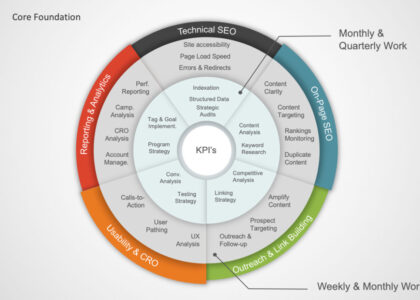The Importance of SEO Analysis in Digital Marketing
Search Engine Optimization (SEO) analysis plays a crucial role in the success of any digital marketing strategy. By conducting a comprehensive SEO analysis, businesses can gain valuable insights into their website’s performance, identify areas for improvement, and ultimately enhance their online visibility.
Understanding SEO Analysis
SEO analysis involves evaluating various aspects of a website to determine how well it is optimized for search engines. This includes assessing factors such as keyword usage, backlink profile, site speed, mobile-friendliness, and overall user experience. By analysing these key metrics, businesses can identify strengths and weaknesses in their SEO strategy.
The Benefits of SEO Analysis
There are several benefits to conducting regular SEO analysis as part of a digital marketing campaign:
- Improved Search Engine Rankings: By identifying and addressing issues that may be hindering your website’s performance, you can improve your search engine rankings and attract more organic traffic.
- Enhanced User Experience: A thorough SEO analysis can help you identify areas where user experience can be improved, leading to higher engagement and conversion rates.
- Competitive Advantage: By staying informed about your competitors’ SEO strategies through analysis, you can adjust your own tactics to stay ahead in the digital landscape.
- Data-Driven Decision Making: SEO analysis provides valuable data that can inform strategic decisions about content creation, site structure, and marketing efforts.
How to Conduct an Effective SEO Analysis
To conduct an effective SEO analysis, businesses should consider the following steps:
- Keyword Research: Identify relevant keywords that align with your business goals and target audience.
- On-Page Optimization: Evaluate on-page elements such as meta tags, headings, and content quality for optimization opportunities.
- Backlink Analysis: Assess the quality and quantity of backlinks pointing to your site to improve domain authority.
- Technical Audit: Check for technical issues like broken links, page speed issues, and mobile responsiveness that may impact search rankings.
- Content Audit: Review existing content for relevance, accuracy, and engagement levels to guide future content creation efforts.
In conclusion, SEO analysis is a fundamental component of any successful digital marketing strategy. By regularly evaluating and improving your website’s SEO performance through analysis, you can drive organic traffic growth, enhance user experience, and achieve long-term online success.
Top 5 Essential SEO Analysis Tips for Enhanced Website Performance
- Perform keyword research to identify relevant and high-ranking keywords for your content.
- Analyse your website’s performance using tools like Google Analytics to track traffic and user behaviour.
- Optimise your meta tags, including title tags and meta descriptions, with targeted keywords.
- Regularly audit your website for broken links, duplicate content, and other issues that can affect SEO performance.
- Monitor your competitors’ SEO strategies to identify opportunities for improvement.
Perform keyword research to identify relevant and high-ranking keywords for your content.
Performing keyword research is a crucial step in SEO analysis to ensure that your content is optimised for search engines. By identifying relevant and high-ranking keywords specific to your industry or niche, you can attract targeted traffic to your website and improve your search engine rankings. Understanding the search terms that users are using allows you to create content that resonates with their queries, increasing the likelihood of your pages appearing in search results. Incorporating these keywords strategically into your content can help drive organic traffic and enhance the overall visibility of your website online.
Analyse your website’s performance using tools like Google Analytics to track traffic and user behaviour.
Analyse your website’s performance using tools like Google Analytics to track traffic and user behaviour. By utilising tools such as Google Analytics, businesses can gain valuable insights into how users interact with their website, including which pages are most popular, how visitors navigate through the site, and where they may be dropping off. This data allows businesses to make informed decisions about their SEO strategy, identify areas for improvement, and ultimately enhance the overall user experience to drive better results.
Optimise your meta tags, including title tags and meta descriptions, with targeted keywords.
To enhance your SEO analysis, it is essential to optimise your meta tags, including title tags and meta descriptions, with targeted keywords. By strategically incorporating relevant keywords into these elements, you can improve your website’s visibility in search engine results pages. Title tags provide a concise and descriptive summary of each webpage’s content, while meta descriptions offer a brief overview that entices users to click through to your site. Ensuring that these meta tags are optimised with the right keywords can significantly impact your site’s search engine rankings and attract more organic traffic.
Regularly audit your website for broken links, duplicate content, and other issues that can affect SEO performance.
Regularly auditing your website for broken links, duplicate content, and other issues is a crucial tip in SEO analysis. Identifying and fixing these issues can significantly improve your website’s SEO performance. Broken links can negatively impact user experience and search engine rankings, while duplicate content can confuse search engines and lead to penalties. By conducting thorough audits and addressing these issues promptly, you can ensure that your website remains optimised for search engines, resulting in better visibility and higher rankings in search results.
Monitor your competitors’ SEO strategies to identify opportunities for improvement.
Monitoring your competitors’ SEO strategies is a valuable tip in SEO analysis. By keeping a close eye on what tactics and keywords your competitors are using, you can gain insights into areas where you can improve your own strategy. Identifying opportunities for enhancement based on competitor analysis allows you to stay competitive in the digital landscape and adjust your approach to attract more organic traffic and increase your online visibility.





